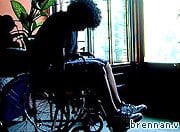The president of a secular disability rights group has warned that legalising assisted suicide would lead to disabled people being coerced and abused.
Diane Coleman, president and CEO of Not Dead Yet, argued that helping people to commit suicide on the grounds of health or disability amounts to the “devaluation” of people’s lives.
Last year, Baroness Campbell, who has spinal muscular atrophy, also gave an impassioned speech against assisted suicide in the House of Lords.
Mistake, coercion and abuse
Coleman, who is herself disabled, said that all major disability rights groups in the US oppose assisted suicide.
She said: “Simply put, assisted suicide sets up a double standard, with suicide prevention for some and suicide assistance for others, depending on their health or disability.
“If such distinctions were based on race or ethnicity, we’d call it bigotry. The dangers of mistake, coercion, and abuse it poses to old, ill and disabled people are rooted in a profound and still largely unacknowledged devaluation of our lives.”
Psychological issues
Coleman referenced reports from the Oregon department of health, which has been monitoring incidences of assisted suicide since its legalisation in Oregon 17 years ago.
She noted that: “The top five reasons doctors give for their patients’ suicides are not pain, or fear of future pain but psychological issues that are all-too-familiar to the disability community”.
According to the reports, 40 per cent of people felt that they would be a “burden on others”, 91 per cent cited a “loss of autonomy” and 79 per cent felt a “loss of dignity”.
Abuse
The CEO said she was worried at the “increasing prevalence” of abuse against elderly disabled people. US Government figures suggest that as many as one in ten elderly people are abused, mainly by care givers and family members.
She added: “Against this backdrop, so-called safeguards in assisted suicide bills are hollow.”
In July last year, disabled Peer Baroness Campbell of Surbiton said the idea of legalising assisted suicide “frightens” her because she could be tempted to ask for it in the future.
Lady Campbell, who uses a wheelchair and relies on a ventilator to help her breathe, said: “Helping people to live with dignity and purpose must surely be our priority”.

